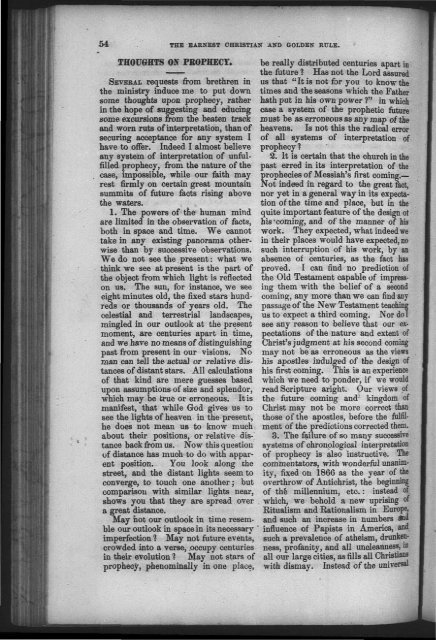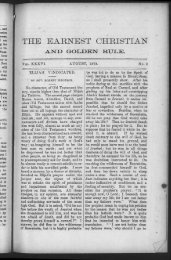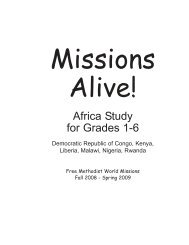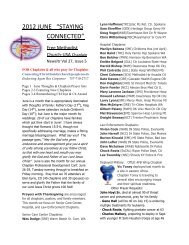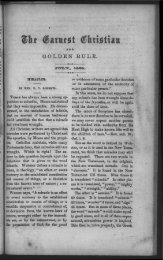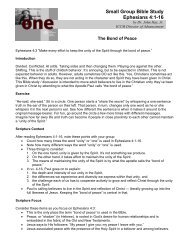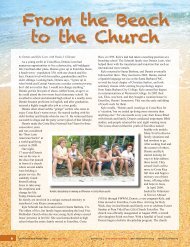Download PDF - Free Methodist Church
Download PDF - Free Methodist Church
Download PDF - Free Methodist Church
Create successful ePaper yourself
Turn your PDF publications into a flip-book with our unique Google optimized e-Paper software.
54 THE EABNEST CHEISTIAN AND GOLDEN BULE.<br />
THOUCfHTS ON FBOFHECY.<br />
SEVEEAL requests from brethren in<br />
the ministry induce me to put down<br />
some thoughts upon prophecy, rather<br />
in the hope of suggesting and educing<br />
some excursions from the beaten track<br />
and worn ruts of interpretation, than of<br />
securing acceptance for any system I<br />
have to offer. Indeed I almost believe<br />
any system of interpretation of unfulfilled<br />
prophecy, from the nature of the<br />
case, impossible, while our faith may<br />
rest firmly on certain great mountain<br />
summits of future facts rising above<br />
the waters.<br />
1. The powers of the human mind<br />
are limited in the observation ot facts,<br />
both in space and time. We cannot<br />
take in any existing panorama otherwise<br />
than by successive observations.<br />
We do not see the present: what we<br />
think we see at present is the part of<br />
the object from which light is reflected<br />
on us. The sun, for instance, we see<br />
eight minutes old, the fixed stars hundreds<br />
or thousands of years old. The<br />
celestial and terrestrial landscapes,<br />
mingled in our outlook at the present<br />
moment, are centuries apart in time,<br />
and we faave no means ot distinguishing<br />
past from present in our visions. No<br />
man can tell the actual or relative distances<br />
of distant stars. All calculations<br />
of that kind are mere guesses based<br />
upon assumptions of size and splendor,<br />
which may be true or erroneous. It is<br />
manifest, that while God gives us to<br />
see the lights of heaven in the present,<br />
he does not mean UB to know much<br />
about their positions, or relative distance<br />
back fix)m us. Now this question<br />
of distance has mudi to do with apparent<br />
position. You look along the<br />
street, and the distant lights seem to<br />
converge, to touch one another; but<br />
comparison with similar lights near,<br />
shows you that they are spread over<br />
a great distance.<br />
May hot our outiook in time resemble<br />
our outlook in space in its necessary<br />
imperfection ? May not future events,<br />
crowded into a verse, occupy centuries<br />
in thefr evolution 1 May not stars of<br />
prophecy, phenominally in one place,<br />
be really distributed centuries apart in<br />
the future 1 Has not the Lord assured<br />
us that "Itis not for you to know tfae<br />
times and the seasons which the Father<br />
hath put in his own power ?" in which<br />
case a system of the prophetic fiiture<br />
must be as erroneous as any map of the<br />
heavens. Is not this the radical error<br />
of aU systems of interpretation of<br />
prophecy ?<br />
2. It is certain that the church in the<br />
past erred in its interpretation of the<br />
prophecies of Messiah's first coming.—<br />
Not indeed in regard to the great fact,<br />
nor yet in a general way in its expectation<br />
ofthe time and place, but in the<br />
quite important feature of the design of<br />
his •coming, and of the manner of his<br />
work. They expected, what indeed we<br />
in their places would have expected, no<br />
sueh interruption of his work, by an<br />
absence of centuries, as the fact has<br />
proved. I can find no prediction of<br />
the Old Testament capable of impressing<br />
them with the belief of a second<br />
coming, any more than we can findany<br />
passsige of the New Testament teaching<br />
us to expect a thfrd coming. Nor do I<br />
see any reason to believe that our expectations<br />
of the nature and extent of<br />
Christ's judgment at his second coming<br />
may not be as erroneous as the riews<br />
his aposties indulged of the design of<br />
his first coming. This is an experience<br />
which we need to ponder, if we would<br />
read Scripture aright. Our views of<br />
tbe future coming and' kingdom of<br />
Christ may not be more correct than<br />
those of the apostles, before the folfilment<br />
of the predictions corrected them.<br />
3. The failure of so many successive<br />
systems of chronological interpretation<br />
of prophecy is also instructive. The<br />
commentators, with wonderful unanimity,<br />
fixed on 1866 as the year of the<br />
overthrow of Antichrist, the beginning<br />
of the millennium, etc.: instead of<br />
which, we behold a new uprising of<br />
Ritualism and Rationalism in Europe,<br />
and such an increase in nvmabers *d<br />
influence of Papists in America, and<br />
such a prevalence of atheism, drunkenness,<br />
profanity, and all uncleaimess, in<br />
all our large cities, as fills all Christians<br />
with dismay. Instead of the universal


